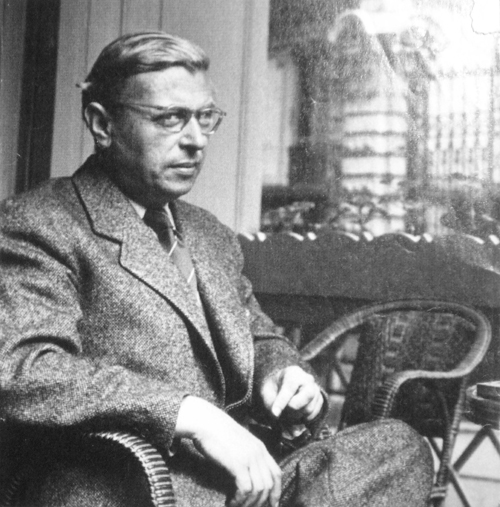
Your complimentary articles
You’ve read one of your four complimentary articles for this month.
You can read four articles free per month. To have complete access to the thousands of philosophy articles on this site, please
Philosophical Haiku
Jean-Paul Sartre (1905-1980)
by Terence Green
Condemned to freedom
Mere being and nothingness
I emerge from choice

At the heart of Sartre’s existentialism is the seemingly paradoxical belief that humanity’s freedom is a burden.
When we make something – a clock, an engine, a butter knife – we begin with an idea of what that thing will do, so that the purpose of that thing is, as it were, built into it. In other words, we start out with the idea of its purpose before we even begin to make it. But human beings are not like that. We come into the world without a purpose. We first come into being, and then must decide for ourselves for what purpose we exist. We cannot ascribe our actions to some pre-existing human nature, in the way that we can explain a clock’s actions by virtue of its nature. This is why Sartre says that we must accept responsibility for who we are and what we do. It is our fate to create ourselves through the choices we make.
It is also our fate, when reading Sartre, to not know exactly what he is talking about. Like Hegel, by whom he was influenced, Sartre was fond of writing in a prodigiously obscure way. Objects in the world have Being, while consciousness itself is Nothingness, because it has no Being. As he writes in Being & Nothingness (1943), “the being by which Nothingness comes to the world must be its own Nothingness.” Basically, what Sartre was trying to say was that it is how we perceive the world that matters, not the raw fact of the world itself (at least, that’s what I think he was trying to say). He could have just put it like that, but then people wouldn’t have worshipped him as a prophet of freedom.
A recurring theme in any discussion of philosophers is the modesty with which they tend to comport themselves. Sartre was no different. Reflecting on himself, and despite his militant atheism, shortly before his death he made the following remark: “I do not feel that I am the product of chance, a speck of dust in the universe, but someone who was expected, prepared, prefigured. In short, a being whom only a Creator could put here; and this idea of a creating hand refers to God.” Given Sartre’s insistence that we are self-creating, one has a sneaking suspicion he was actually saying that he was God.
© Terence Green 2017
Terence is a peripatetic (though not Peripatetic) writer, historian and lecturer. He holds a PhD in the history of political thought from Columbia University, NYC, and lives with his wife and their dog in Wellington, NZ. He blogs at hardlysurprised.blogspot.co.nz.









